Statements
Share
Tweet
Email
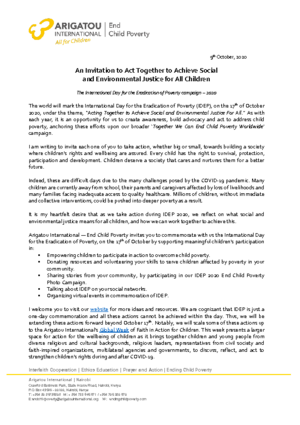
An Invitation to Act Together to Achieve Social and Environmental Justice for All Children
The world will mark the International Day for the Eradication of Poverty (IDEP), on the 17th of October 2020, under the theme, “Acting Together to Achieve Social and Environmental Justice For All.” As with each year, it is an opportunity for us to create awareness, build advocacy and act to address child poverty, anchoring these efforts upon our broader ‘Together We Can End Child Poverty Worldwide’ campaign. I am writing to invite each one of you to take action, whether big or small, towards building a society where children’s rights and wellbeing are assured. Every child has the right to survival, protection, participation and development. Children deserve a society that cares and nurtures them for a better future. Indeed, these are difficult days due to the many challenges posed by the COVID-19 pandemic. Many children are currently away from school, their parents and caregivers affected by loss of livelihoods and many families facing inadequate access to quality healthcare. Millions of children, without immediate and collective interventions, could be pushed into deeper poverty as a result.
An Invitation to Act Together to Achieve Social and Environmental Justice for All Children
The world will mark the International Day for the Eradication of Poverty (IDEP), on the 17th of October 2020, under the theme, “Acting Together to Achieve Social and Environmental Justice For All.” As with each year, it is an opportunity for us to create awareness, build advocacy and act to address child poverty, anchoring these efforts upon our broader ‘Together We Can End Child Poverty Worldwide’ campaign. I am writing to invite each one of you to take action, whether big or small, towards building a society where children’s rights and wellbeing are assured. Every child has the right to survival, protection, participation and development. Children deserve a society that cares and nurtures them for a better future. Indeed, these are difficult days due to the many challenges posed by the COVID-19 pandemic. Many children are currently away from school, their parents and caregivers affected by loss of livelihoods and many families facing inadequate access to quality healthcare. Millions of children, without immediate and collective interventions, could be pushed into deeper poverty as a result.
An Invitation to Act Together to Achieve Social and Environmental Justice for All Children
The world will mark the International Day for the Eradication of Poverty (IDEP), on the 17th of October 2020, under the theme, “Acting Together to Achieve Social and Environmental Justice For All.” As with each year, it is an opportunity for us to create awareness, build advocacy and act to address child poverty, anchoring these efforts upon our broader ‘Together We Can End Child Poverty Worldwide’ campaign. I am writing to invite each one of you to take action, whether big or small, towards building a society where children’s rights and wellbeing are assured. Every child has the right to survival, protection, participation and development. Children deserve a society that cares and nurtures them for a better future. Indeed, these are difficult days due to the many challenges posed by the COVID-19 pandemic. Many children are currently away from school, their parents and caregivers affected by loss of livelihoods and many families facing inadequate access to quality healthcare. Millions of children, without immediate and collective interventions, could be pushed into deeper poverty as a result.
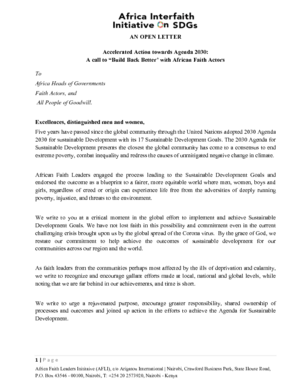
Accelerated Action Towards Agenda 2030: A Call to “Build Back Better’ with African Faith Actors
Five years have passed since the global community through the United Nations adopted 2030 Agenda 2030 for sustainable Development with its 17 Sustainable Development Goals. The 2030 Agenda for Sustainable Development presents the closest the global community has come to a consensus to end extreme poverty, combat inequality and redress the causes of unmitigated negative change in climate. African Faith Leaders engaged the process leading to the Sustainable Development Goals and endorsed the outcome as a blueprint to a fairer, more equitable world where men, women, boys and girls, regardless of creed or origin can experience life free from the adversities of deeply running poverty, injustice, and threats to the environment. We write to you at a critical moment in the global effort to implement and achieve Sustainable Development Goals. We have not lost faith in this possibility and commitment even in the current challenging crisis brought upon us by the global spread of the Corona virus. By the grace of God, we restate our commitment to help achieve the outcomes of sustainable development for our communities across our region and the world.
Accelerated Action Towards Agenda 2030: A Call to “Build Back Better’ with African Faith Actors
Five years have passed since the global community through the United Nations adopted 2030 Agenda 2030 for sustainable Development with its 17 Sustainable Development Goals. The 2030 Agenda for Sustainable Development presents the closest the global community has come to a consensus to end extreme poverty, combat inequality and redress the causes of unmitigated negative change in climate. African Faith Leaders engaged the process leading to the Sustainable Development Goals and endorsed the outcome as a blueprint to a fairer, more equitable world where men, women, boys and girls, regardless of creed or origin can experience life free from the adversities of deeply running poverty, injustice, and threats to the environment. We write to you at a critical moment in the global effort to implement and achieve Sustainable Development Goals. We have not lost faith in this possibility and commitment even in the current challenging crisis brought upon us by the global spread of the Corona virus. By the grace of God, we restate our commitment to help achieve the outcomes of sustainable development for our communities across our region and the world.
Accelerated Action Towards Agenda 2030: A Call to “Build Back Better’ with African Faith Actors
Five years have passed since the global community through the United Nations adopted 2030 Agenda 2030 for sustainable Development with its 17 Sustainable Development Goals. The 2030 Agenda for Sustainable Development presents the closest the global community has come to a consensus to end extreme poverty, combat inequality and redress the causes of unmitigated negative change in climate. African Faith Leaders engaged the process leading to the Sustainable Development Goals and endorsed the outcome as a blueprint to a fairer, more equitable world where men, women, boys and girls, regardless of creed or origin can experience life free from the adversities of deeply running poverty, injustice, and threats to the environment. We write to you at a critical moment in the global effort to implement and achieve Sustainable Development Goals. We have not lost faith in this possibility and commitment even in the current challenging crisis brought upon us by the global spread of the Corona virus. By the grace of God, we restate our commitment to help achieve the outcomes of sustainable development for our communities across our region and the world.
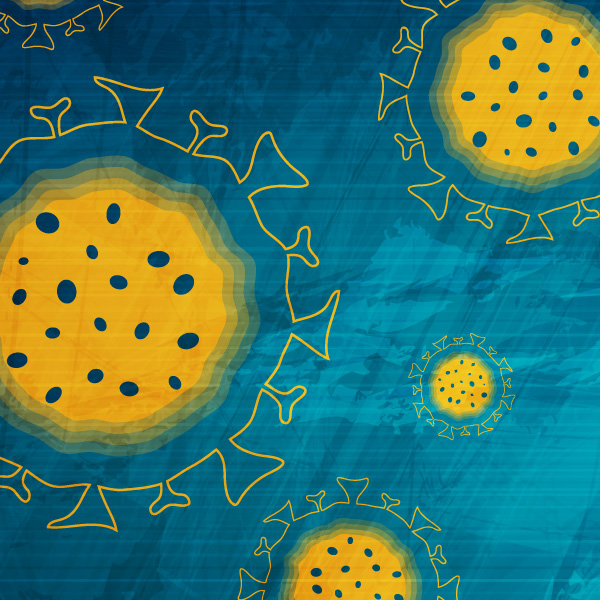
STATEMENT ON COVID – 19
COVID-19 threatens to push millions more people into poverty and deprivation across the world, risking reversing the progress made so far, towards reaching the 2030 Agenda and the Sustainable Development Goals (SDGs). The World Bank estimates that 49 million more people will fall into extreme poverty with the number likely to rise to 100 million. As a convening of religious and faith-based actors working to end Extreme Poverty and Realize the Sustainable Development Goals, we are fearful of the unfolding crisis and alarmed that the global community must take every measure not only to counter the spread of COVID-19, but also to mitigate and reverse its economic and social impacts especially on the most vulnerable communities, particularly women, children and displaced people. We note and are encouraged by other statements referring to the COVID-19 pandemic, issued recently; particularly the Joint Statement by United Nations Interagency Task Force on Religion and Sustainable Development (IATF) with the endorsement of the IATF Multi- Faith Advisory Council2. We hold the view that it is our duty to champion the rights of those impacted by COVID-19 and call upon the global faith communities to hold to account governments and global institutions including the World Bank Group [WBG], in this regard.
STATEMENT ON COVID – 19
COVID-19 threatens to push millions more people into poverty and deprivation across the world, risking reversing the progress made so far, towards reaching the 2030 Agenda and the Sustainable Development Goals (SDGs). The World Bank estimates that 49 million more people will fall into extreme poverty with the number likely to rise to 100 million. As a convening of religious and faith-based actors working to end Extreme Poverty and Realize the Sustainable Development Goals, we are fearful of the unfolding crisis and alarmed that the global community must take every measure not only to counter the spread of COVID-19, but also to mitigate and reverse its economic and social impacts especially on the most vulnerable communities, particularly women, children and displaced people. We note and are encouraged by other statements referring to the COVID-19 pandemic, issued recently; particularly the Joint Statement by United Nations Interagency Task Force on Religion and Sustainable Development (IATF) with the endorsement of the IATF Multi- Faith Advisory Council2. We hold the view that it is our duty to champion the rights of those impacted by COVID-19 and call upon the global faith communities to hold to account governments and global institutions including the World Bank Group [WBG], in this regard.
STATEMENT ON COVID – 19
COVID-19 threatens to push millions more people into poverty and deprivation across the world, risking reversing the progress made so far, towards reaching the 2030 Agenda and the Sustainable Development Goals (SDGs). The World Bank estimates that 49 million more people will fall into extreme poverty with the number likely to rise to 100 million. As a convening of religious and faith-based actors working to end Extreme Poverty and Realize the Sustainable Development Goals, we are fearful of the unfolding crisis and alarmed that the global community must take every measure not only to counter the spread of COVID-19, but also to mitigate and reverse its economic and social impacts especially on the most vulnerable communities, particularly women, children and displaced people. We note and are encouraged by other statements referring to the COVID-19 pandemic, issued recently; particularly the Joint Statement by United Nations Interagency Task Force on Religion and Sustainable Development (IATF) with the endorsement of the IATF Multi- Faith Advisory Council2. We hold the view that it is our duty to champion the rights of those impacted by COVID-19 and call upon the global faith communities to hold to account governments and global institutions including the World Bank Group [WBG], in this regard.
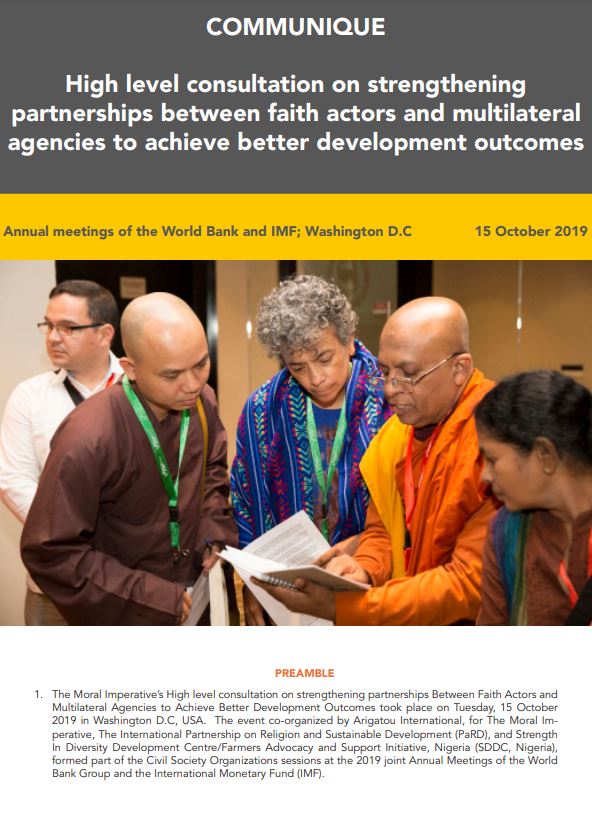
Communique – High level consultation on strengthening partnerships between faith actors and multilateral agencies to achieve better development outcomes
The Moral Imperative’s High level consultation on strengthening partnerships Between Faith Actors and Multilateral Agencies to Achieve Better Development Outcomes took place on Tuesday, 15 October 2019 in Washington D.C, USA. The event co-organized by Arigatou International, for The Moral Imperative, The International Partnership on Religion and Sustainable Development (PaRD), and Strength In Diversity Development Centre/Farmers Advocacy and Support Initiative, Nigeria (SDDC, Nigeria), formed part of the Civil Society Organizations sessions at the 2019 joint Annual Meetings of the World Bank Group and the International Monetary Fund (IMF).
The event, consisted of a high level panel presentation and an open question and answer session. Through the forum, the Moral Imperative sought to make a case for securing better outcomes for poverty alleviation, revitalizing partnerships and strategic synergies between faith actors and multilateral agencies, to achieve development. The event also formed a platform to draw debate on how to best faith actors’ contribution towards ending extreme poverty through collaboration between faith actors and multilateral agencies at country and regional levels; and with special referencing to inclusive development, scaling-up investments in human capital development, women and gender equality and child poverty.
Communique – High level consultation on strengthening partnerships between faith actors and multilateral agencies to achieve better development outcomes
The Moral Imperative’s High level consultation on strengthening partnerships Between Faith Actors and Multilateral Agencies to Achieve Better Development Outcomes took place on Tuesday, 15 October 2019 in Washington D.C, USA. The event co-organized by Arigatou International, for The Moral Imperative, The International Partnership on Religion and Sustainable Development (PaRD), and Strength In Diversity Development Centre/Farmers Advocacy and Support Initiative, Nigeria (SDDC, Nigeria), formed part of the Civil Society Organizations sessions at the 2019 joint Annual Meetings of the World Bank Group and the International Monetary Fund (IMF).
The event, consisted of a high level panel presentation and an open question and answer session. Through the forum, the Moral Imperative sought to make a case for securing better outcomes for poverty alleviation, revitalizing partnerships and strategic synergies between faith actors and multilateral agencies, to achieve development. The event also formed a platform to draw debate on how to best faith actors’ contribution towards ending extreme poverty through collaboration between faith actors and multilateral agencies at country and regional levels; and with special referencing to inclusive development, scaling-up investments in human capital development, women and gender equality and child poverty.
Communique – High level consultation on strengthening partnerships between faith actors and multilateral agencies to achieve better development outcomes
The Moral Imperative’s High level consultation on strengthening partnerships Between Faith Actors and Multilateral Agencies to Achieve Better Development Outcomes took place on Tuesday, 15 October 2019 in Washington D.C, USA. The event co-organized by Arigatou International, for The Moral Imperative, The International Partnership on Religion and Sustainable Development (PaRD), and Strength In Diversity Development Centre/Farmers Advocacy and Support Initiative, Nigeria (SDDC, Nigeria), formed part of the Civil Society Organizations sessions at the 2019 joint Annual Meetings of the World Bank Group and the International Monetary Fund (IMF).
The event, consisted of a high level panel presentation and an open question and answer session. Through the forum, the Moral Imperative sought to make a case for securing better outcomes for poverty alleviation, revitalizing partnerships and strategic synergies between faith actors and multilateral agencies, to achieve development. The event also formed a platform to draw debate on how to best faith actors’ contribution towards ending extreme poverty through collaboration between faith actors and multilateral agencies at country and regional levels; and with special referencing to inclusive development, scaling-up investments in human capital development, women and gender equality and child poverty.
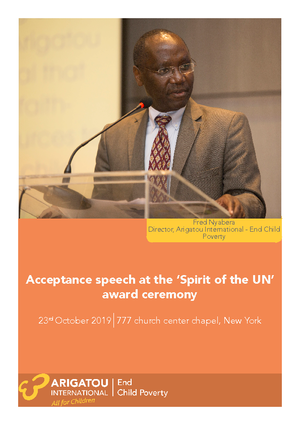
Spirit of the UN Award
Our engagement in creating a better world for all children is aimed at saving their lives, alleviating their suffering and maintaining their sacred human dignity. Now this is a task that may appear daunting…but this noble award that I have received today, reminds me of the inspiring words of a wise woman who once told me Fred…you may not change the whole world...but you can change the whole world for one child at a time.
Spirit of the UN Award
Our engagement in creating a better world for all children is aimed at saving their lives, alleviating their suffering and maintaining their sacred human dignity. Now this is a task that may appear daunting…but this noble award that I have received today, reminds me of the inspiring words of a wise woman who once told me Fred…you may not change the whole world...but you can change the whole world for one child at a time.
Spirit of the UN Award
Our engagement in creating a better world for all children is aimed at saving their lives, alleviating their suffering and maintaining their sacred human dignity. Now this is a task that may appear daunting…but this noble award that I have received today, reminds me of the inspiring words of a wise woman who once told me Fred…you may not change the whole world...but you can change the whole world for one child at a time.
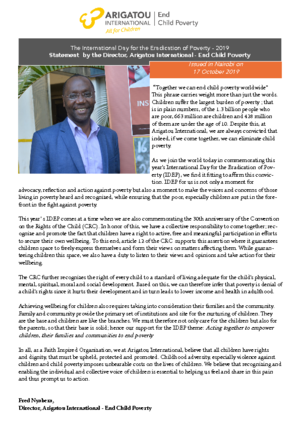
ECP Director’s Statement – IDEP 2019
“Together we can end child poverty worldwide” This phrase carries weight more than just the words. Children suffer the largest burden of poverty[1]; that is in plain numbers, of the 1.3 billion people who are poor, 663 million are children and 428 million of them are under the age of 10. Despite this, at Arigatou International, we are always convicted that indeed, if we come together, we can eliminate child poverty.
As we join the world today in commemorating this year’s International Day for the Eradication of Poverty (IDEP), we find it fitting to affirm this conviction. IDEP for us is not only a moment for advocacy, reflection and action against poverty but also a moment to make the voices and concerns of those living in poverty heard and recognized, while ensuring that the poor, especially children are put in the forefront in the fight against poverty.
ECP Director’s Statement – IDEP 2019
“Together we can end child poverty worldwide” This phrase carries weight more than just the words. Children suffer the largest burden of poverty[1]; that is in plain numbers, of the 1.3 billion people who are poor, 663 million are children and 428 million of them are under the age of 10. Despite this, at Arigatou International, we are always convicted that indeed, if we come together, we can eliminate child poverty.
As we join the world today in commemorating this year’s International Day for the Eradication of Poverty (IDEP), we find it fitting to affirm this conviction. IDEP for us is not only a moment for advocacy, reflection and action against poverty but also a moment to make the voices and concerns of those living in poverty heard and recognized, while ensuring that the poor, especially children are put in the forefront in the fight against poverty.
ECP Director’s Statement – IDEP 2019
“Together we can end child poverty worldwide” This phrase carries weight more than just the words. Children suffer the largest burden of poverty[1]; that is in plain numbers, of the 1.3 billion people who are poor, 663 million are children and 428 million of them are under the age of 10. Despite this, at Arigatou International, we are always convicted that indeed, if we come together, we can eliminate child poverty.
As we join the world today in commemorating this year’s International Day for the Eradication of Poverty (IDEP), we find it fitting to affirm this conviction. IDEP for us is not only a moment for advocacy, reflection and action against poverty but also a moment to make the voices and concerns of those living in poverty heard and recognized, while ensuring that the poor, especially children are put in the forefront in the fight against poverty.
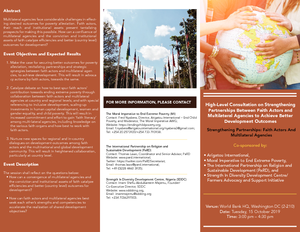
Side Event: Strengthening Partnerships: Faith Actors And Multilateral Agencies
This side event was sponsored by Arigatou International in collaboration with the Moral Imperative to End Extreme poverty, the International Partnership on Religion and Sustainable Development (PaRD) and Strength In Diversity Development Centre/Farmers Advocacy and Support Initiative, Nigeria (SDDC, Nigeria). The event titled: Strengthening Partnerships Between Faith Actors and Multilateral Agencies to Achieve Better Development Outcomes, took place during the annual meetings of the World Bank and the IMF on 15 October 2019, in Washington D.C, United States of America. The event aimed to make case for securing better outcomes for poverty alleviation, revitalizing partnerships and strategic synergies between faith actors and multilateral agencies, to achieve development; thereby resulting in advocacy actions by faith actors.
Side Event: Strengthening Partnerships: Faith Actors And Multilateral Agencies
This side event was sponsored by Arigatou International in collaboration with the Moral Imperative to End Extreme poverty, the International Partnership on Religion and Sustainable Development (PaRD) and Strength In Diversity Development Centre/Farmers Advocacy and Support Initiative, Nigeria (SDDC, Nigeria). The event titled: Strengthening Partnerships Between Faith Actors and Multilateral Agencies to Achieve Better Development Outcomes, took place during the annual meetings of the World Bank and the IMF on 15 October 2019, in Washington D.C, United States of America. The event aimed to make case for securing better outcomes for poverty alleviation, revitalizing partnerships and strategic synergies between faith actors and multilateral agencies, to achieve development; thereby resulting in advocacy actions by faith actors.
Side Event: Strengthening Partnerships: Faith Actors And Multilateral Agencies
This side event was sponsored by Arigatou International in collaboration with the Moral Imperative to End Extreme poverty, the International Partnership on Religion and Sustainable Development (PaRD) and Strength In Diversity Development Centre/Farmers Advocacy and Support Initiative, Nigeria (SDDC, Nigeria). The event titled: Strengthening Partnerships Between Faith Actors and Multilateral Agencies to Achieve Better Development Outcomes, took place during the annual meetings of the World Bank and the IMF on 15 October 2019, in Washington D.C, United States of America. The event aimed to make case for securing better outcomes for poverty alleviation, revitalizing partnerships and strategic synergies between faith actors and multilateral agencies, to achieve development; thereby resulting in advocacy actions by faith actors.

African Youth SDGs Summit Outcome Statement
We the African youth participating in the 2nd African Youth SDGs (Sustainable Development Goals) summit, having gathered in Accra, Ghana from the 7th to 9th November 2018, to collectively discuss, connect and advocate for partnering to move from policy to action in the implementation of the Agenda 2030 and Agenda 2063, declare the following resolutions.
African Youth SDGs Summit Outcome Statement
We the African youth participating in the 2nd African Youth SDGs (Sustainable Development Goals) summit, having gathered in Accra, Ghana from the 7th to 9th November 2018, to collectively discuss, connect and advocate for partnering to move from policy to action in the implementation of the Agenda 2030 and Agenda 2063, declare the following resolutions.
African Youth SDGs Summit Outcome Statement
We the African youth participating in the 2nd African Youth SDGs (Sustainable Development Goals) summit, having gathered in Accra, Ghana from the 7th to 9th November 2018, to collectively discuss, connect and advocate for partnering to move from policy to action in the implementation of the Agenda 2030 and Agenda 2063, declare the following resolutions.
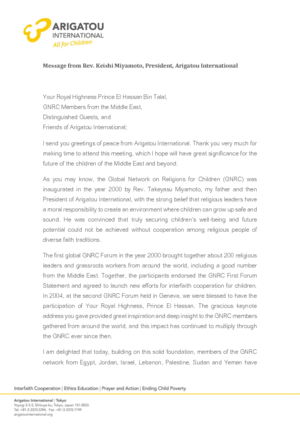
GNRC Middle East Regional Meeting Amman, Jordan April 23rd, 2019
Message from Rev. Keishi Miyamoto, President, Arigatou International
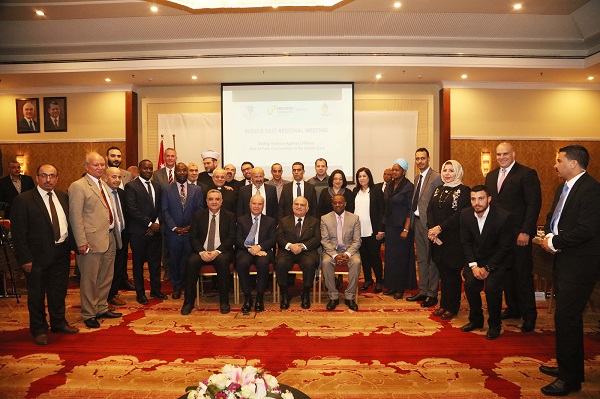
GNRC Middle East Regional Meeting Amman, Jordan April 23rd, 2019
Message from Rev. Keishi Miyamoto, President, Arigatou International

GNRC Middle East Regional Meeting Amman, Jordan April 23rd, 2019
Message from Rev. Keishi Miyamoto, President, Arigatou International

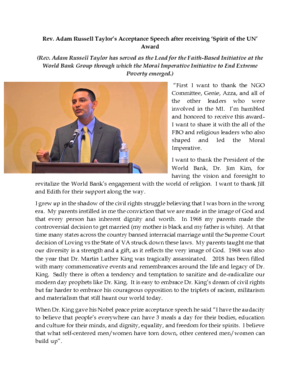
Rev. Adam Russell Taylor’s Acceptance Speech after receiving ‘Spirit of the UN’ Award
Rev. Adam Russell Taylor has served as the Lead for the Faith-Based Initiative at the World Bank Group through which the Moral Imperative Initiative to End Extreme Poverty emerged.
Rev. Adam Russell Taylor’s Acceptance Speech after receiving ‘Spirit of the UN’ Award
Rev. Adam Russell Taylor has served as the Lead for the Faith-Based Initiative at the World Bank Group through which the Moral Imperative Initiative to End Extreme Poverty emerged.
Rev. Adam Russell Taylor’s Acceptance Speech after receiving ‘Spirit of the UN’ Award
Rev. Adam Russell Taylor has served as the Lead for the Faith-Based Initiative at the World Bank Group through which the Moral Imperative Initiative to End Extreme Poverty emerged.
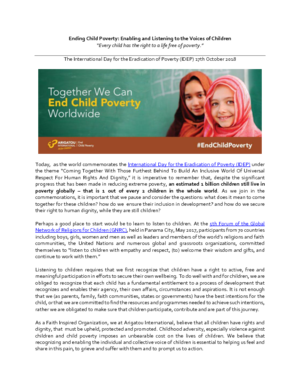
International Day for the Eradication of Poverty – Director’s Statement
Respect For Human Rights And Dignity,” it is imperative to remember that, despite the significant progress that has been made in reducing extreme poverty, an estimated 1 billion children still live in poverty globally – that is 1 out of every 2 children in the whole world. As we join in the commemorations, it is important that we pause and consider the questions: what does it mean to come together for these children? how do we ensure their inclusion in development? and how do we secure their right to human dignity, while they are still children?
International Day for the Eradication of Poverty – Director’s Statement
Respect For Human Rights And Dignity,” it is imperative to remember that, despite the significant progress that has been made in reducing extreme poverty, an estimated 1 billion children still live in poverty globally – that is 1 out of every 2 children in the whole world. As we join in the commemorations, it is important that we pause and consider the questions: what does it mean to come together for these children? how do we ensure their inclusion in development? and how do we secure their right to human dignity, while they are still children?
International Day for the Eradication of Poverty – Director’s Statement
Respect For Human Rights And Dignity,” it is imperative to remember that, despite the significant progress that has been made in reducing extreme poverty, an estimated 1 billion children still live in poverty globally – that is 1 out of every 2 children in the whole world. As we join in the commemorations, it is important that we pause and consider the questions: what does it mean to come together for these children? how do we ensure their inclusion in development? and how do we secure their right to human dignity, while they are still children?
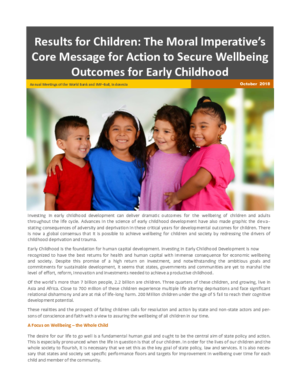
Results for Children: Securing the Well-being Outcomes for Early Childhood
Investing in early childhood development can deliver dramatic outcomes for the well being of children and adults throughout the life cycle. Advances in the science of early childhood development have also made graphic the devastating consequences of adversity and deprivation in these critical years for development goals. There is now a global consensus that it is possible to achieve well being for children and society by redressing the drivers of childhood deprivation and trauma. The resourcefulness of faith, and the assets and services of faith institutions are critical to the wellbeing outcomes of millions of children, and especially those at risk and thus vulnerable to adversity. Faced with adversity, millions of children, families and communities have come to rely on this resourcefulness to grow their resilience.
Results for Children: Securing the Well-being Outcomes for Early Childhood
Investing in early childhood development can deliver dramatic outcomes for the well being of children and adults throughout the life cycle. Advances in the science of early childhood development have also made graphic the devastating consequences of adversity and deprivation in these critical years for development goals. There is now a global consensus that it is possible to achieve well being for children and society by redressing the drivers of childhood deprivation and trauma. The resourcefulness of faith, and the assets and services of faith institutions are critical to the wellbeing outcomes of millions of children, and especially those at risk and thus vulnerable to adversity. Faced with adversity, millions of children, families and communities have come to rely on this resourcefulness to grow their resilience.
Results for Children: Securing the Well-being Outcomes for Early Childhood
Investing in early childhood development can deliver dramatic outcomes for the well being of children and adults throughout the life cycle. Advances in the science of early childhood development have also made graphic the devastating consequences of adversity and deprivation in these critical years for development goals. There is now a global consensus that it is possible to achieve well being for children and society by redressing the drivers of childhood deprivation and trauma. The resourcefulness of faith, and the assets and services of faith institutions are critical to the wellbeing outcomes of millions of children, and especially those at risk and thus vulnerable to adversity. Faced with adversity, millions of children, families and communities have come to rely on this resourcefulness to grow their resilience.
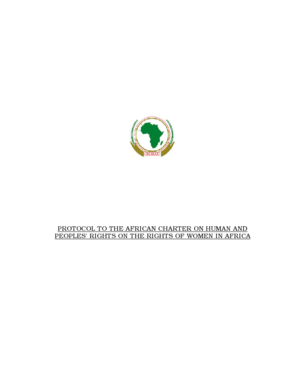
The Maputo Protocol
The Maputo Protocol was originally adopted by the “Assembly of the African Union” in Maputo, Mozambique on July 11, 2003. The official document is titled “Protocol to the African Charter on Human and People’s Rights on the Rights of Women in Africa.” The Maputo Protocol is a treaty instrument that is binding on all countries that ratify it. It went into effect in November 2005, after the minimum 15 of the 53 African Union member countries ratified it. As of June 2007, according to the African Union, 43 nations had signed it and 21 had formally ratified it: (Benin, Burkina Faso, Cape Verde, Comoros, Djibouti, Gambia, Libya, Lesotho, Malawi, Mali, Mozambique, Mauritania, Namibia, Nigeria, Rwanda, South Africa, Senegal, Seychelles, Tanzania, Togo and Zambia). Those who ratify the treaty are called “States Parties.”
The Maputo Protocol
The Maputo Protocol was originally adopted by the “Assembly of the African Union” in Maputo, Mozambique on July 11, 2003. The official document is titled “Protocol to the African Charter on Human and People’s Rights on the Rights of Women in Africa.” The Maputo Protocol is a treaty instrument that is binding on all countries that ratify it. It went into effect in November 2005, after the minimum 15 of the 53 African Union member countries ratified it. As of June 2007, according to the African Union, 43 nations had signed it and 21 had formally ratified it: (Benin, Burkina Faso, Cape Verde, Comoros, Djibouti, Gambia, Libya, Lesotho, Malawi, Mali, Mozambique, Mauritania, Namibia, Nigeria, Rwanda, South Africa, Senegal, Seychelles, Tanzania, Togo and Zambia). Those who ratify the treaty are called “States Parties.”
The Maputo Protocol
The Maputo Protocol was originally adopted by the “Assembly of the African Union” in Maputo, Mozambique on July 11, 2003. The official document is titled “Protocol to the African Charter on Human and People’s Rights on the Rights of Women in Africa.” The Maputo Protocol is a treaty instrument that is binding on all countries that ratify it. It went into effect in November 2005, after the minimum 15 of the 53 African Union member countries ratified it. As of June 2007, according to the African Union, 43 nations had signed it and 21 had formally ratified it: (Benin, Burkina Faso, Cape Verde, Comoros, Djibouti, Gambia, Libya, Lesotho, Malawi, Mali, Mozambique, Mauritania, Namibia, Nigeria, Rwanda, South Africa, Senegal, Seychelles, Tanzania, Togo and Zambia). Those who ratify the treaty are called “States Parties.”
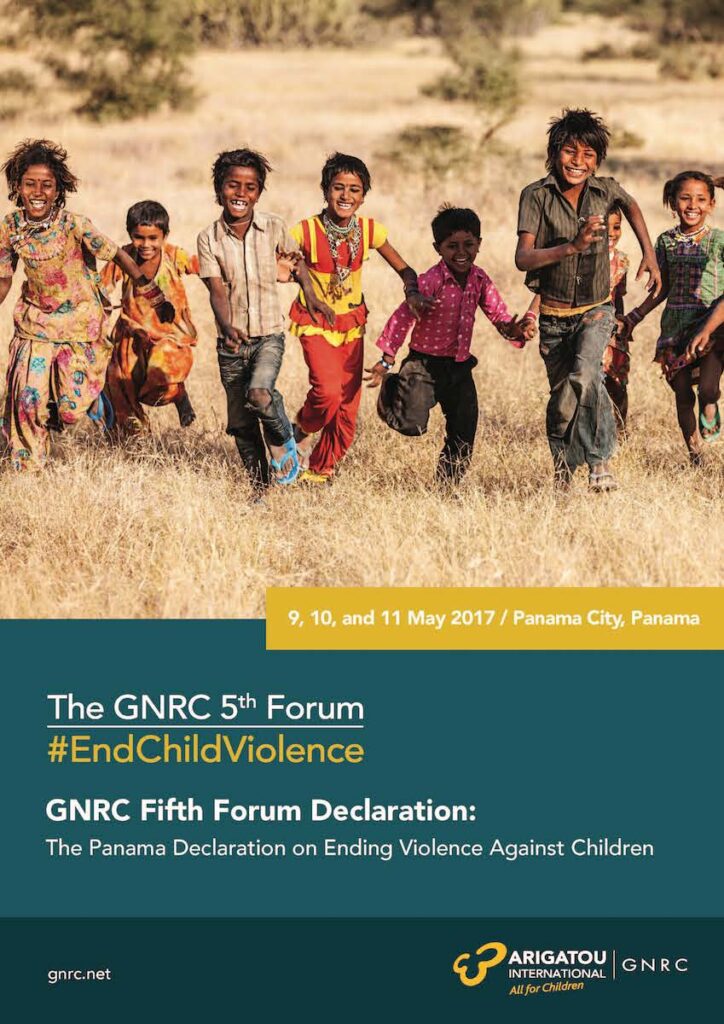
The Panama Declaration on Ending Violence Against Children
The causes of violence against children are complex and varied. They include socio-economic causes such as poverty and social exclusion, and many other deeply rooted political, cultural and familial factors. Ending today’s unprecedented violence against children calls for extraordinary and urgent collaboration among religious and spiritual communities, UN agencies, international and multilateral organizations, governments, civil society, the private sector, media — and, most importantly, with children. This declaration is an affirmation by the participants during the forum in fulfilling their pledge in taking part to ending Violence against Children.
The Panama Declaration on Ending Violence Against Children
The causes of violence against children are complex and varied. They include socio-economic causes such as poverty and social exclusion, and many other deeply rooted political, cultural and familial factors. Ending today’s unprecedented violence against children calls for extraordinary and urgent collaboration among religious and spiritual communities, UN agencies, international and multilateral organizations, governments, civil society, the private sector, media — and, most importantly, with children. This declaration is an affirmation by the participants during the forum in fulfilling their pledge in taking part to ending Violence against Children.
The Panama Declaration on Ending Violence Against Children
The causes of violence against children are complex and varied. They include socio-economic causes such as poverty and social exclusion, and many other deeply rooted political, cultural and familial factors. Ending today’s unprecedented violence against children calls for extraordinary and urgent collaboration among religious and spiritual communities, UN agencies, international and multilateral organizations, governments, civil society, the private sector, media — and, most importantly, with children. This declaration is an affirmation by the participants during the forum in fulfilling their pledge in taking part to ending Violence against Children.
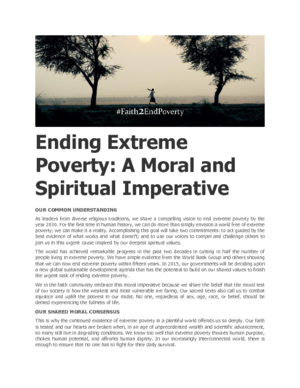
Ending Extreme Poverty: A Moral and Spiritual Imperative
This Moral and Spiritual Imperative statement seeks to generate the necessary social and political will by inspiring greater commitments from others to join in this cause, tapping into many of the shared convictions and beliefs that unify the world’s major religions around the call and responsibility to combat poverty.
Ending Extreme Poverty: A Moral and Spiritual Imperative
This Moral and Spiritual Imperative statement seeks to generate the necessary social and political will by inspiring greater commitments from others to join in this cause, tapping into many of the shared convictions and beliefs that unify the world’s major religions around the call and responsibility to combat poverty.
Ending Extreme Poverty: A Moral and Spiritual Imperative
This Moral and Spiritual Imperative statement seeks to generate the necessary social and political will by inspiring greater commitments from others to join in this cause, tapping into many of the shared convictions and beliefs that unify the world’s major religions around the call and responsibility to combat poverty.
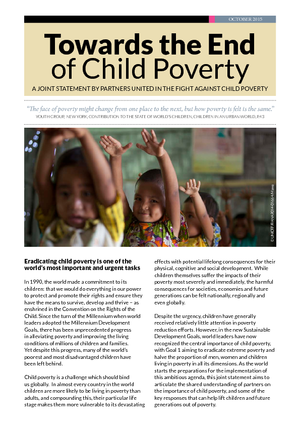
Global Coalition Partners Against Child Poverty – Joint Statement
Child poverty is a challenge which should bind us globally. In almost every country in the world children are more likely to be living in poverty than adults, and compounding this, their particular life stage makes them more vulnerable to its devastating effects with potential lifelong consequences for their physical, cognitive and social development. While children themselves suffer the impacts of their poverty most severely and immediately, the harmful consequences for societies, economies and future generations can be felt nationally, regionally and even globally.
Global Coalition Partners Against Child Poverty – Joint Statement
Child poverty is a challenge which should bind us globally. In almost every country in the world children are more likely to be living in poverty than adults, and compounding this, their particular life stage makes them more vulnerable to its devastating effects with potential lifelong consequences for their physical, cognitive and social development. While children themselves suffer the impacts of their poverty most severely and immediately, the harmful consequences for societies, economies and future generations can be felt nationally, regionally and even globally.
Global Coalition Partners Against Child Poverty – Joint Statement
Child poverty is a challenge which should bind us globally. In almost every country in the world children are more likely to be living in poverty than adults, and compounding this, their particular life stage makes them more vulnerable to its devastating effects with potential lifelong consequences for their physical, cognitive and social development. While children themselves suffer the impacts of their poverty most severely and immediately, the harmful consequences for societies, economies and future generations can be felt nationally, regionally and even globally.
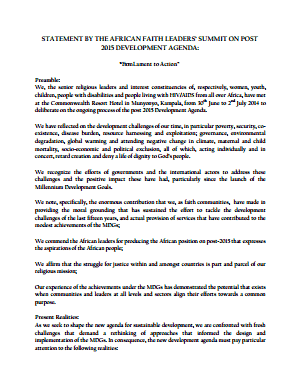
Statement by the African Faith Leaders Summit on the Post 2015 Development Agenda
We, the senior religious leaders and interest constituencies of, respectively, women, youth, children, people with disabilities and people living with HIV/AIDS from all over Africa, have met at the Commonwealth Resort Hotel in Munyonyo, Kampala, from 30th June to 2nd July 2014 to deliberate on the ongoing process of the post 2015 Development Agenda.
Statement by the African Faith Leaders Summit on the Post 2015 Development Agenda
We, the senior religious leaders and interest constituencies of, respectively, women, youth, children, people with disabilities and people living with HIV/AIDS from all over Africa, have met at the Commonwealth Resort Hotel in Munyonyo, Kampala, from 30th June to 2nd July 2014 to deliberate on the ongoing process of the post 2015 Development Agenda.
Statement by the African Faith Leaders Summit on the Post 2015 Development Agenda
We, the senior religious leaders and interest constituencies of, respectively, women, youth, children, people with disabilities and people living with HIV/AIDS from all over Africa, have met at the Commonwealth Resort Hotel in Munyonyo, Kampala, from 30th June to 2nd July 2014 to deliberate on the ongoing process of the post 2015 Development Agenda.
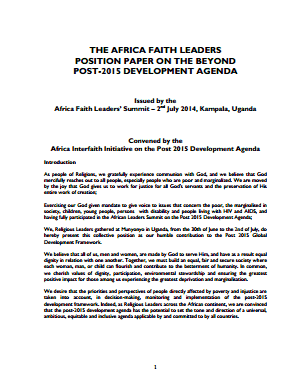
Africa Faith Leaders Position Paper on the Post 2015 Development Agenda
As Faith communities, we possess perhaps the largest infrastructure for development in many communities and play critical roles in community building. Communities around the world have come to trust faith leaders and institutions as we work to boost local resilience and copying capacity.
Africa Faith Leaders Position Paper on the Post 2015 Development Agenda
As Faith communities, we possess perhaps the largest infrastructure for development in many communities and play critical roles in community building. Communities around the world have come to trust faith leaders and institutions as we work to boost local resilience and copying capacity.
Africa Faith Leaders Position Paper on the Post 2015 Development Agenda
As Faith communities, we possess perhaps the largest infrastructure for development in many communities and play critical roles in community building. Communities around the world have come to trust faith leaders and institutions as we work to boost local resilience and copying capacity.